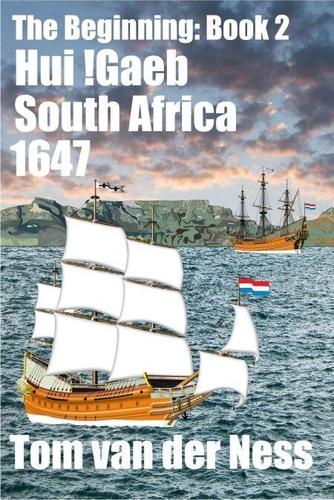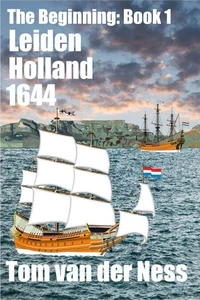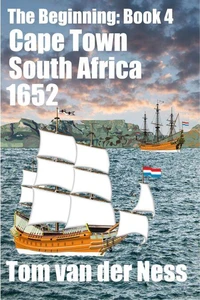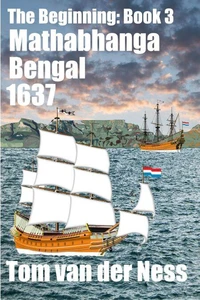Nouveauté
//Hui !Gaeb South Africa: Decades before Europeans settled the southern tip of Africa, native Khoikhoi victualled over a 1 000 ship's scurvy - ridden crews. (# 2 The Beginning). The Beginning, #2
Par :Formats :
Disponible dans votre compte client Decitre ou Furet du Nord dès validation de votre commande. Le format ePub est :
- Compatible avec une lecture sur My Vivlio (smartphone, tablette, ordinateur)
- Compatible avec une lecture sur liseuses Vivlio
- Pour les liseuses autres que Vivlio, vous devez utiliser le logiciel Adobe Digital Edition. Non compatible avec la lecture sur les liseuses Kindle, Remarkable et Sony
 , qui est-ce ?
, qui est-ce ?Notre partenaire de plateforme de lecture numérique où vous retrouverez l'ensemble de vos ebooks gratuitement
Pour en savoir plus sur nos ebooks, consultez notre aide en ligne ici
- FormatePub
- ISBN8230959427
- EAN9798230959427
- Date de parution18/08/2025
- Protection num.pas de protection
- Infos supplémentairesepub
- ÉditeurIndependently Published
Résumé
Under the apartheid regime, and the British before them, up until today, with the inclusion of the current government, the widely accepted curricula taught by all, are aligned to the fact that the colonisation of the Cape by the Dutch in sixteen-fifty-two, is the supposed beginning of the port. This account debunks that theory and corrects the largely as yet untold facts. Long before Holland's involvement, for more than half-a-century, well over a thousand ships with their scurvy-ridden crews entered the proto-port and were nursed back to health, and were victualled with fresh supplies by the indigenous Khoikhoi tribe.
Although they have almost been lost to history, this story focuses on the life of the indigene 'Harry' and his niece 'Kratoa' as the Dutch called them - both famous figures known by all of the Cape's international maritime trade in the mid seventeenth century. Prior to the annexation by the Dutch, Kratoa's rich tapestry of events while living solely in harmony with nature, is a fascinating and historically accurate tale and sets the record straight about how the indigenous people in the region actually lived.
The story is based on researched facts and is historically accurate.
Although they have almost been lost to history, this story focuses on the life of the indigene 'Harry' and his niece 'Kratoa' as the Dutch called them - both famous figures known by all of the Cape's international maritime trade in the mid seventeenth century. Prior to the annexation by the Dutch, Kratoa's rich tapestry of events while living solely in harmony with nature, is a fascinating and historically accurate tale and sets the record straight about how the indigenous people in the region actually lived.
The story is based on researched facts and is historically accurate.
Under the apartheid regime, and the British before them, up until today, with the inclusion of the current government, the widely accepted curricula taught by all, are aligned to the fact that the colonisation of the Cape by the Dutch in sixteen-fifty-two, is the supposed beginning of the port. This account debunks that theory and corrects the largely as yet untold facts. Long before Holland's involvement, for more than half-a-century, well over a thousand ships with their scurvy-ridden crews entered the proto-port and were nursed back to health, and were victualled with fresh supplies by the indigenous Khoikhoi tribe.
Although they have almost been lost to history, this story focuses on the life of the indigene 'Harry' and his niece 'Kratoa' as the Dutch called them - both famous figures known by all of the Cape's international maritime trade in the mid seventeenth century. Prior to the annexation by the Dutch, Kratoa's rich tapestry of events while living solely in harmony with nature, is a fascinating and historically accurate tale and sets the record straight about how the indigenous people in the region actually lived.
The story is based on researched facts and is historically accurate.
Although they have almost been lost to history, this story focuses on the life of the indigene 'Harry' and his niece 'Kratoa' as the Dutch called them - both famous figures known by all of the Cape's international maritime trade in the mid seventeenth century. Prior to the annexation by the Dutch, Kratoa's rich tapestry of events while living solely in harmony with nature, is a fascinating and historically accurate tale and sets the record straight about how the indigenous people in the region actually lived.
The story is based on researched facts and is historically accurate.






